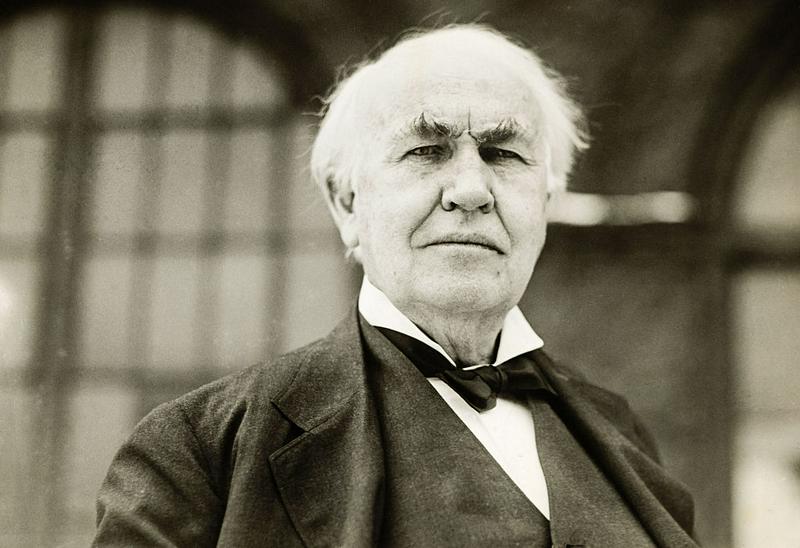Thomas Edison: Everything You Didn't Know About The Famous Inventor
By | October 16, 2020

The name "Thomas Edison" is almost synonymous with American innovation and ingenuity. This is the man, after all, who gave us the light bulb, phonograph, and the electric power generator. He held more than 1,000 patents, the most by any person in the United States, and founded the country's first industrial research facility. But there is much more to this prolific inventor than the electric light bulb—which, by the way, he didn't really invent.

The Wizard Of Menlo Park
Thomas Edison was called "the Wizard of Menlo Park" because he gave birth to his magical inventions in his laboratory in Menlo Park, New Jersey. The laboratory, the first of its kind in America, was built with the profits from the sale of Edison's quadruplex telegraph (an invention that allowed four signals to travel along the same wire at once) to Western Union for $10,000.
He chose New Jersey for the site because it was convenient to his customers in New York City, Boston, and other areas along the East Coast, but Edison was a Midwest boy himself. He was born in Milan, Ohio in 1847 to a Canadian father and New York mother and moved to Port Huron, Michigan with his family in 1854. The couple's youngest child seemed happy in the Great Lakes region, starting his own business selling newspapers, candy, and vegetables on the trains that ran between Detroit and Port Huron at just 13 years old. He earned a profit of $50 per week, which he used to buy electrical equipment and chemicals for his basement laboratory.
It was a job that put him miraculously in the right place at the right time to rescue a three-year-old boy who had wandered into the path of an oncoming train one day. The lad's father, the station agent at the local depot, was so grateful to Edison that he offered to train him in telegraph operation.

Edison's Personal Life
Thomas Edison's hearing began to decline when he was just 12 years old. Although he was fond of telling elaborate tales to explain his hearing loss, claiming his eardrum was ruptured in a fight, most historians contend that he either contracted scarlet fever or suffered from numerous untreated ear infections in his youth. Edison supposedly "listened" to his mother play the piano by biting into the wood of the instrument and feeling the vibrations, which had the side effect of teaching him quite a bit about the properties of sound.
Thomas Edison was married twice, first to 16-year-old Mary Stilwell on Christmas Day 1871, when he was 24. The couple had three children, two of whom were nicknamed "Dot" and "Dash," but shortly after Mary died at just 29 years old, Edison married 20-year-old Mina Miller. Edison fathered three more kids with his second wife, but despite having so many children, he was never much of a family man. He preferred to spend his time in his lab.

The Brilliance Of Thomas Edison
You may think that someone as innovative and successful as Thomas Edison would hold multiple advanced degrees from prestigious universities, but he actually never attended school for longer than a few months until he was 28 years old. His mother, who once worked as a schoolteacher, taught Edison and his siblings the basics of math, reading, and writing at home. He tried his hand at public school but found that he preferred to learn at home without the distractions of a classroom setting, and today, many psychologists reviewing Edison's life suspect that he had attention-deficit/hyperactivity disorder. As an adult, Edison enrolled in a four-year course in chemistry at the Cooper Union for the Advancement of Science and Art.
Thomas Edison liked to surround himself with other brilliant minds, whether it was at his lab or during his rare downtime. He was good buddies with fellow Michigander Henry Ford, and the two friends took semi-frequent camping trips with Harvey Firestone (yes, the tire guy) and naturalist John Burroughs, where they cleared their minds and discussed the problems facing Americans of their day. Oh, they also invented Kingsford charcoal during these camping trips.
Back at the lab, Edison paid particular mind to a young Serbian-American engineer named Nikola Tesla. Edison was one of the first people to recognize the strange foreigner's genius, and while they bonded over their shared vision of a grid system of electricity that would provide every home with the modern marvel, they famously clashed over whether a direct or alternating current was the best method of delivery, with Edison favoring the former and Tesla the latter. As time went on, it became clear that they were divided by much more than currents. As the older and more established inventor, Edison may have won the "current war," but he lost his friendship with Tesla in the process.

About That Light Bulb
Most people are taught that Thomas Edison invented the light bulb, but the reality is much more complicated. Electric-powered street lights already existed before Edison invented his light bulb, but they were inefficient and expensive to produce. In 1878, Edison tasked his group of geniuses at Menlo Park with finding the perfect material to make a better filament, and as the oft-referenced story goes, he experimented with more than 6,000 different materials before he found one that checked all his boxes. When asked about his thousands of failures, Edison countered that he had not failed but rather "learned 6,000 ways to not make a light bulb."

